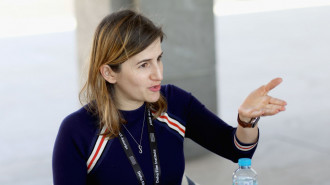
Neglected, displaced, targeted: How Israel's war on Gaza has devastated the disabled community

Israel's relentless attacks on the Gaza Strip have drastically exacerbated the suffering of Gaza's disabled community and their families, especially with repeated displacement depriving many of the essentials they need.
The near-total collapse of the health sector — deliberately left in tatters by Israel — has left them vulnerable to disease and additional health complications.
Around 93,000 Gazans are estimated to have been injured during the war – a huge rise to Gaza's already high number of disabled residents, the majority of whom are casualties of previous Israeli wars on the Strip.
Sousan Abu Namous, who is from Gaza City, is trying to provide a basic level of care for three of her children who have different disabilities, as the family struggles to cope with the horrific conditions Palestinians across Gaza are enduring.
Sousan's family have been displaced multiple times and are currently living in a canvas tent.
Their situation mirrors that of thousands of other families who have members with a disability, deprived of the expert care they used to receive in specialist medical and social centres – even though these were limited in scope and services due to the 18-year siege Israel imposed on the Strip.
Specialist disability care centres grind to a halt
Sousan says to Al-Araby Al-Jadeed, The New Arab's Arabic-language sister edition: "I care for a family of eight, including three who are disabled."
She explains that her 21-year-old daughter Roba and her 18-year-old son Abdullah both have muscular atrophy and hearing difficulties.
She adds that her youngest son Siraj, who is 10 and physically disabled, has started displaying the same signs, and also suffers from a sight impairment.
It is difficult to provide suitable care for her children, she says, in light of the ongoing Israeli aggression and the family's repeated displacements.
First, they fled from their neighbourhood in Tel Hawa, Gaza City, to a school-turned-shelter in Khan Younes. Then they were displaced to a tent near the Rafah Crossing, before moving to another tent in Deir Balah in central Gaza.
Now they are in a special camp for disabled people.
"The lack of some necessities was an issue before the war, due to the impact of Israel's siege, but my children got basic services from some institutions specialised in care for the disabled, including wheelchair provision," says Sousan.
However, during the war, they have not been able to access any new supplies, with basics like shoes, cleaning materials, diapers and tissues unavailable.
Widad Owda's 13-year-old twins Omar and Ali have suffered from a motor impairment since birth – the result of a clinical error.
They are currently in a small tent in Deir Balah, having been displaced many times, first from their home in Gaza City.
"Our sufferings get worse with every new displacement due to my sons' mobility difficulties," she says, adding that their wheelchairs were damaged, "at a time all of their specialist care is missing due to the collapsed health system, as well as the destruction of the various specialist disability centres in the Gaza Strip."
She says the lack of specialist facilities had been an issue anyway, a repercussion of Israel's blockade.
This also led to an inability of the Strip to keep pace with new assistive technologies and equipment for disabled people.
Shehata Abu Rabia has a family of six to support, including his eldest son, Mohammed, 14, who is visually impaired.
He explains that during the war, his son's psychological state deteriorated and he became unusually withdrawn and unwilling to talk to his family, sinking into long silences.
Shehata says Mohammed had been dedicated to his studies, which he received in braille, before the current war.
However, he has lost interest in them. His father believes the fact that the family is constantly preoccupied with seeking safety, constantly on the verge of having to move again or wait in long queues for water or bread and aid means that they have not been able to pay Mohammed the attention he used to get before the war.
"The war has painfully impacted everyone but its negative effects on my son and others with multiple disabilities have been more severe, as their cases need specialised and long-term care," Shehata says.
All care, medical and psychological, as well as suitable equipment for them, is now unavailable.
In addition to the dire situation faced by Gaza's disabled community due to the deterioration in their living conditions, Israeli soldiers have also directly and deliberately targeted disabled individuals.
Mohammed Bhar, who had Downs Syndrome, autism and speech difficulties, was mauled to death by an Israeli army attack dog.
The 24-year-old was unable to move without help from his family, who had been displaced six times since October 7.
Israeli forces raided the house the family were in on July 3, 2024, with the soldiers setting the dog on Mohammed, who was unable to move as the animal mauled his arm and chest.
The Israelis then separated the family from Mohammed, forcing them to leave the house. When the family managed to return one week later, Mohammed was dead.
Before the current war, the Palestinian Central Bureau of Statistics (PCBS) indicated there were around 58,000 disabled individuals living in the Gaza Strip, accounting for around 2.6% of the population.
However, the war has added huge numbers of newly disabled Gazans and it will not be possible to calculate how many until the war is over.
The previous PCBS report noted that the highest prevalence of disability was in the North Gaza governorate, with around 5% of the region's inhabitants registered as disabled, followed by the Deir Balah governorate at 4.1%.
It also pointed out that the number of disabled Gazans doubled between 2007 and 2017, rising from 24,608 to 48,140.
According to the 2022 annual health report in Gaza, the number of disabled individuals was 55,538, with physical disabilities forming 47 % of registered cases.
Gazan disability care specialist, Mohammed Abu Kameel, explains that Israel's blockade had caused the reality faced by disabled Gazans to deteriorate hugely over the past 18 years, crowning the enforced deprivation with a long and savage war that killed tens of thousands.
He adds that around 93,000 Palestinians have been inflicted with various disabilities since October 7 – through war injuries – with many having been forced to endure amputations.
"The negative effects of Israel's war have multiplied the hardships faced by all Palestinians, but they are more severe for disabled people," he said.
"Gaza's disabled face several crises, including the danger facing everyone, the scarcity of service provision for them due to the destruction of most relevant institutions, and the absence of any entity devoted to providing the necessary services and regular care they need."
This is an edited translation based on an article from our Arabic edition with additional reporting. To read the original article click here
Translated by Rose Chacko
This article is taken from our Arabic sister publication, Al-Araby Al Jadeed and mirrors the source's original editorial guidelines and reporting policies. Any requests for correction or comment will be forwarded to the original authors and editors
Have questions or comments? Email us at: info@alaraby.co.uk






 Follow the Middle East's top stories in English at The New Arab on Google News
Follow the Middle East's top stories in English at The New Arab on Google News


